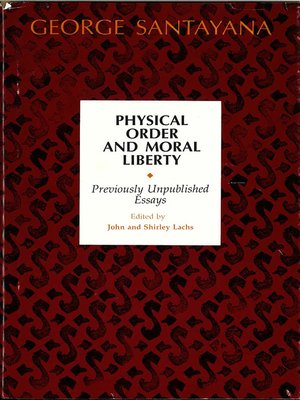Physical Order and Moral Liberty
ebook ∣ Previously Unpublished Essays of George Santayana · Vintage Vanderbilt
By George Santayana

Sign up to save your library
With an OverDrive account, you can save your favorite libraries for at-a-glance information about availability. Find out more about OverDrive accounts.
Find this title in Libby, the library reading app by OverDrive.



Search for a digital library with this title
Title found at these libraries:
| Library Name | Distance |
|---|---|
| Loading... |
This book is a collection of fifty-five essays and fragments by George Santayana, from the Santayana collections of the Columbia University Library and the Humanities Research Center at the University of Texas.
Although the essay included are largely philosophical in nature, none is narrowly technical. The general reader should be able to understand most of the pieces, as well as enjoy their literary quality and profit by the insights and wisdom they provide. The philosopher may draw courage from the speculative spirit of the essays and benefit by Santayana's steadfast vision and his sensitivity to distinctions.
For the serious student of Santayana's thought, this volume will prove indispensable. It contains sustained philosophical studies of causation (the only ones by Santayana anywhere), substantial elaborations of Santayana's ideas on the relation of sensation to thought, and reflections on the nature of freedom and the spiritual life. In addition, Santayana develops here a new theory of "critical instants" and elaborates on his ideas of the nature of consciousness and its relations to time.
Sections on the philosophy of nature and the philosophy of mind are followed by groups of essays on ethics, the philosophy of politics, and the freedom of mind—in which, according to Santayana, the blessing of the good life consists. The book concludes with brief notes on Bergson, Democritus, and Leibniz and a longer essay on the thought of Vaihinger.
Although the essay included are largely philosophical in nature, none is narrowly technical. The general reader should be able to understand most of the pieces, as well as enjoy their literary quality and profit by the insights and wisdom they provide. The philosopher may draw courage from the speculative spirit of the essays and benefit by Santayana's steadfast vision and his sensitivity to distinctions.
For the serious student of Santayana's thought, this volume will prove indispensable. It contains sustained philosophical studies of causation (the only ones by Santayana anywhere), substantial elaborations of Santayana's ideas on the relation of sensation to thought, and reflections on the nature of freedom and the spiritual life. In addition, Santayana develops here a new theory of "critical instants" and elaborates on his ideas of the nature of consciousness and its relations to time.
Sections on the philosophy of nature and the philosophy of mind are followed by groups of essays on ethics, the philosophy of politics, and the freedom of mind—in which, according to Santayana, the blessing of the good life consists. The book concludes with brief notes on Bergson, Democritus, and Leibniz and a longer essay on the thought of Vaihinger.







